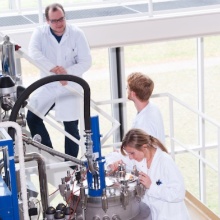The biochemical engineering activities are deeply rooted in systems metabolic engineering by applying and developing relevant tools. Moreover, synthetic biology tools are used to create novel production platforms for large-scale application.
Modeling
Modeling is the enabling technology that structures knowledge and allows quantitative prediction of subcellular, cellular, and inter-cellular dynamics as an essential building block of strain and process engineering. As such, modelling activities are key for scale-up and strain engineering.
Examples of additional modeling studies are:
Selection of publications:
Selection of publications:
Selection of publications:
Selection of publications:
Please Contact

Ralf Takors
Prof. Dr.-Ing.Professor







